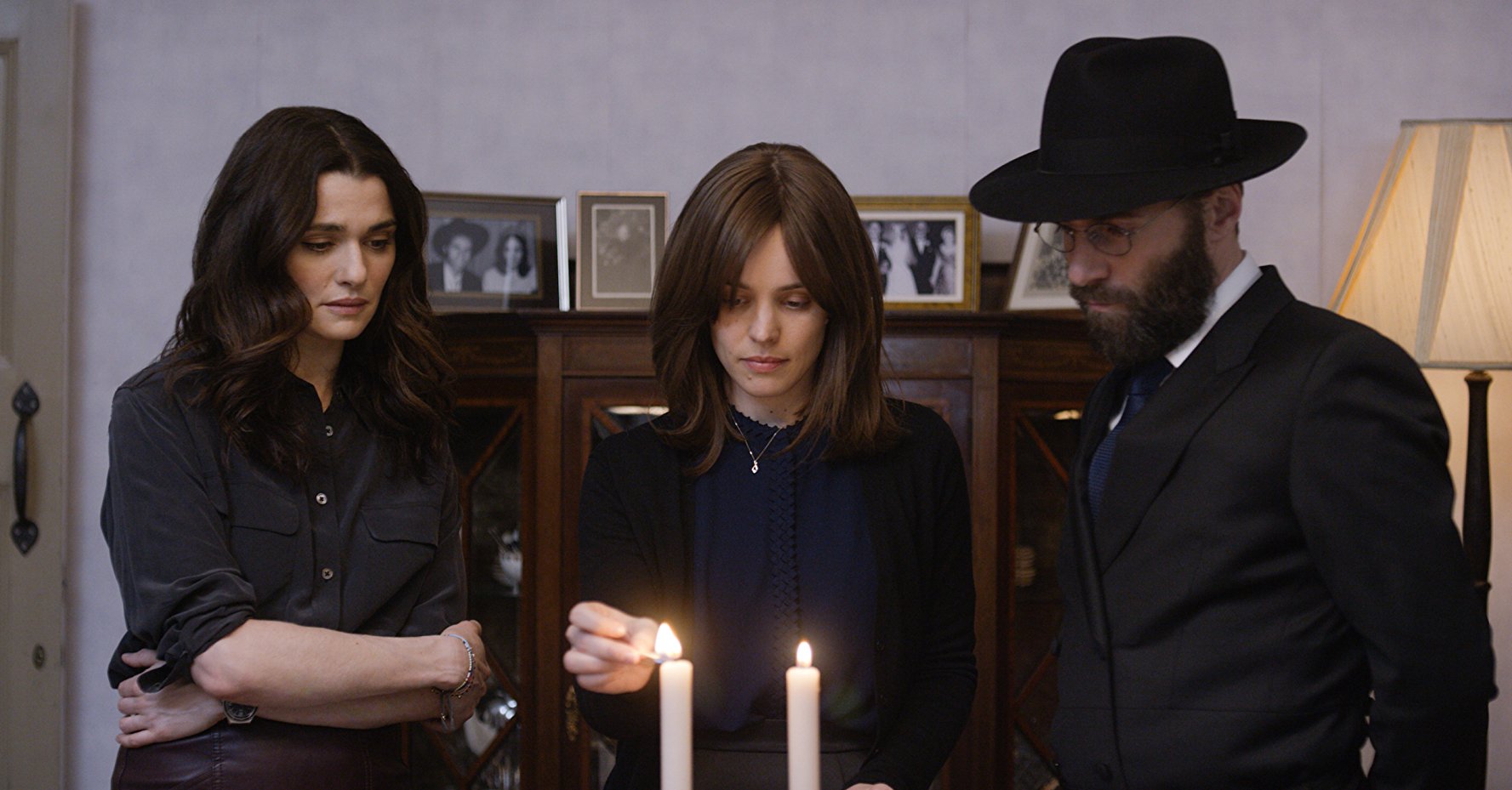by Jason Adams

Movies are hard on people who leave. Homecomings are where it's at - the triumphant reestablishment of the family unit over adversity. Those who go away were mistaken. They were selfish. They were only looking out for themselves. Disobedience is about a woman who leaves. And it's about her homecoming, but one fraught with error - one we'll see slowly unravel as a ruse; not at all what it seems.
Ronit (Rachel Weisz) is a photographer in New York who gets a message that her father in London has died. She flies back for the burial, and as she does we see she comes from an Orthodox Jewish community and her father was a beloved Rabbi - slowly, the black hats close in around her. And from under them suddenly a friendly face - Dovid (Alessandro Nivola), and soon after his wife Esti (Rachel McAdams). These three clearly have history. These early scenes are thick with unspoken things - the trio move slowly through quiet spaces, sorting themselves into place...
That warmth and friendliness alongside sadness grows confused as the days pass, and old feelings start to feel the sun upon them - things thought dead were just hibernating.
 If you've seen the trailer then you know (that's my version of a spoiler warning) that Ronit and Esti are former lovers, now reunited. Ronit ran. The real mystery becomes what did she run from? From Esti, or from this world and its rules and stifling expectations?
If you've seen the trailer then you know (that's my version of a spoiler warning) that Ronit and Esti are former lovers, now reunited. Ronit ran. The real mystery becomes what did she run from? From Esti, or from this world and its rules and stifling expectations?
But then it's not really much of a mystery - Disobedience isn't really interested at playing those sorts of games; what happens happens straightforwardly with far less melodrama than you're anticipating, and much to its benefit. At every turn it wants to know what these characters are going through - it doesn't want to jerk us around. These are all decent people. They are all trying. But sometimes it's just better to go.
There's a moment in Disobedience where Esti tells Ronit, terrified as she sees her slipping away again, that "it's easy for you to go."
"No, it isn't," Ronit says back. And she means it, and the movie means it, and the movie takes it's entire runtime explaining why no, it's not easy to go. But sometimes it's necessary. Sometimes home isn't where the heart is, Dear Reader, sometimes it is where the hurt is. The movies are part of the world and the world spends so much time telling those of us who had to run in order to survive that we failed, we were weak, that when one comes along that knows what it means to leave it takes the wind right out of you.
Disobedience took the wind right out of me. Not just because it has three very fine actors giving some of their finest work ever up on the screen - you're going to hear me talk about Alessandro Nivola's performance very loudly all year long and even then after that, you guys - but because writer-director Sebastián Lelio (yes, it's him again, and so soon after his film A Fantastic Woman made my top ten of 2017) really has something to say about communities, about the ways they serve both as good and bad in the world, and friend and foe, and how we need to figure out for ourselves just how we fit into them.
And he does it with so much grace and humanity, radiating from everybody involved, that you feel wrapped up in it yourself. "Disobedience" as a noun is a negative property - the act of not doing something; of not obeying. Disobedience the film shows us how an absence can be an everything, a lifeline, a life -- two lives even, lived in tandem across literal oceans. Love fills in the gaps; you just have to plow ahead to make that space for it to follow.

Disobedience plays tonight at Tribeca (8:00 PM), Wed 4/25 (7:00 PM) and opens Friday 4/27 in select cities